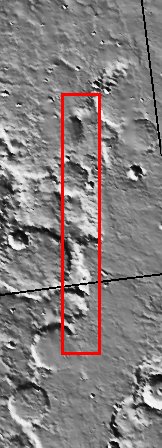
Released August 27, 2004
The THEMIS Image of the Day will be exploring the nomenclature of Mars for the next three weeks.
Scylla Scopulus
- Scolupus: lobate of irregular scarp
- Scylla: The nymph Scylla was turned into a 6-headed monster by the sorceress Circe. As a monster Scylla ate six of Odysseus' crewmen in Homer's Odyssey.
Scylla Scopulus is an irregular scarp located in the southern highlands of Mars. The arrows on the daytime IR image are pointing to the scarp where it crosses the image. Scylla Scopulus faces eastward, while Charybdis Scopulus [located to the east of Scylla] faces westward.
Nomenclature Fact of the Day: The asteroid Gaspra was named for a spa in the Crimea, so its craters are named for spas worldwide.
Image information: IR instrument. Latitude -20.1, Longitude 19 East (341 West). 100 meter/pixel resolution.
Note: this THEMIS visual image has not been radiometrically nor geometrically calibrated for this preliminary release. An empirical correction has been performed to remove instrumental effects. A linear shift has been applied in the cross-track and down-track direction to approximate spacecraft and planetary motion. Fully calibrated and geometrically projected images will be released through the Planetary Data System in accordance with Project policies at a later time.
NASA's Jet Propulsion Laboratory manages the 2001 Mars Odyssey mission for NASA's Office of Space Science, Washington, D.C. The Thermal Emission Imaging System (THEMIS) was developed by Arizona State University, Tempe, in collaboration with Raytheon Santa Barbara Remote Sensing. The THEMIS investigation is led by Dr. Philip Christensen at Arizona State University. Lockheed Martin Astronautics, Denver, is the prime contractor for the Odyssey project, and developed and built the orbiter. Mission operations are conducted jointly from Lockheed Martin and from JPL, a division of the California Institute of Technology in Pasadena.

 Planetary Data System
Planetary Data System













